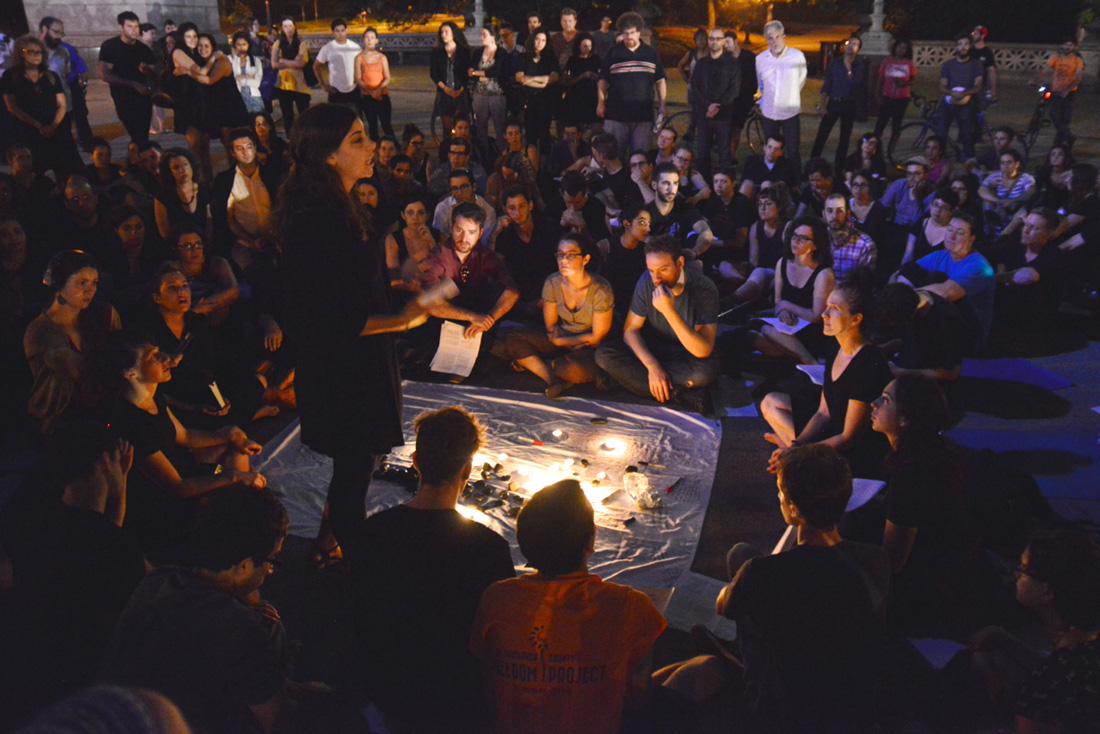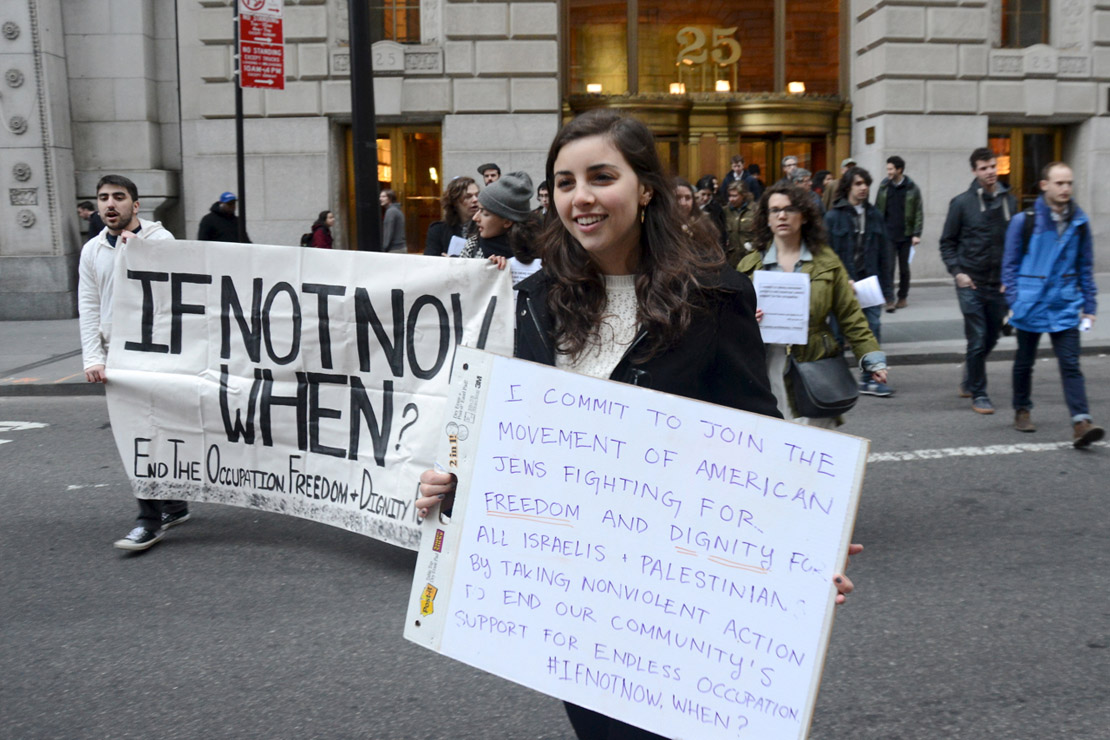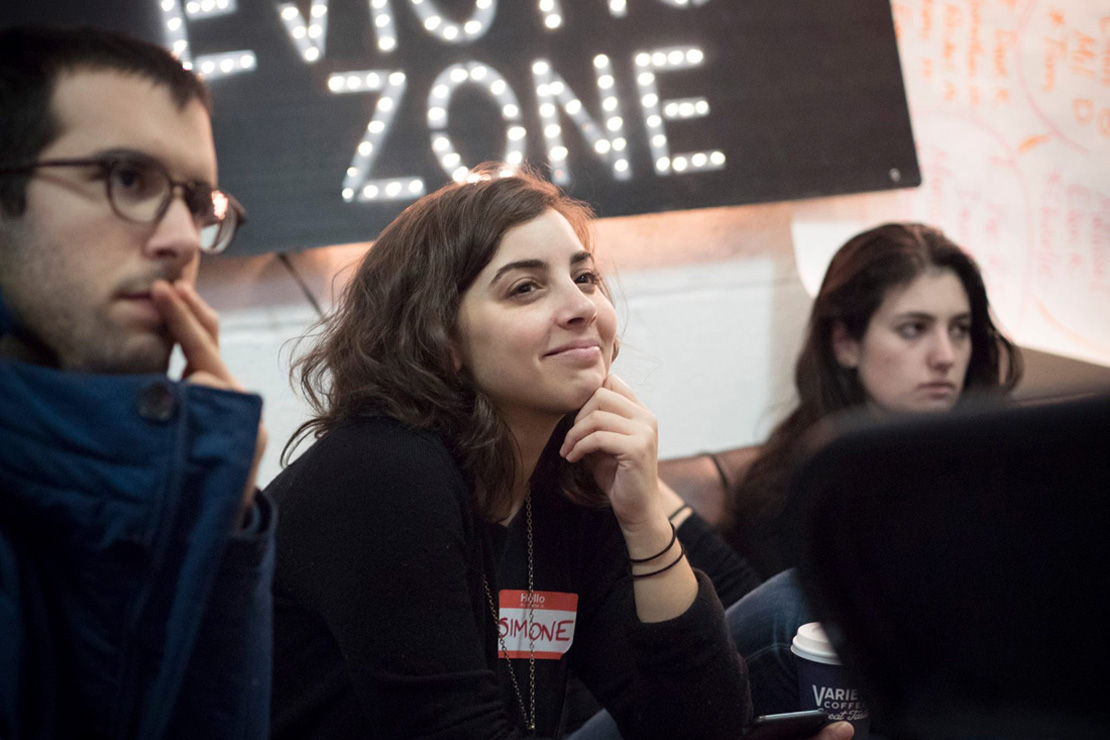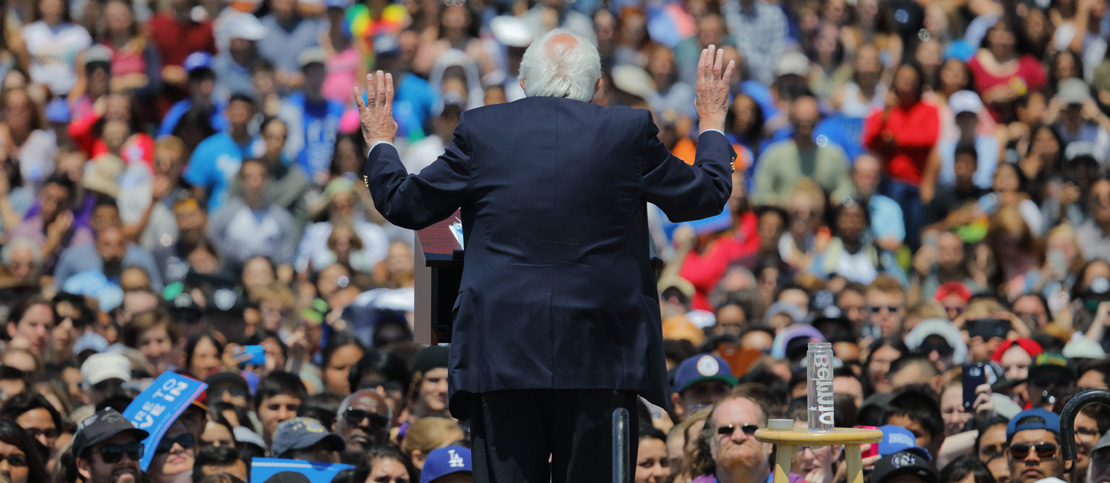By Isaac Luria
Simone Zimmerman has become an inspiring figure for American Jewish progressives in recent months — and a boogey-woman for the Right.
When the Bernie Sanders campaign fired her over a Facebook post — in which she used some “colorful language” to describe the Israeli prime minister — she became one of this campaign season’s proxy battles in the ongoing Jewish argument over the Israeli-Palestinian conflict.
We sat down with Simone earlier this month for her first interview since being fired from the campaign, where she reveals exactly what took place inside the campaign, the right-wing attack that targeted her, and how the campaign was caught off-guard by the way “the Jewish establishment pounces on [its] youth who dare to say something different.”
Of course Simone’s story is about how a young woman from a traditional Jewish upbringing deeply anchored in the institutions of the American Jewish community becomes a dedicated anti-occupation activist. It also provides vital insight into the shifting tides in the American Jewish community, which are pushing more and more young people along a similar path.
Simone’s political transformation began on an American college campus when she was faced with arguments — and people — that her pro-Israel activism had not prepared her to confront, and with which Jewish organizations on campus did not want to engage. Meeting Palestinians and hearing their stories — in California, Israel and Palestine — unraveled yet another layer.
But like many in her generation, it was Israel’s recent wars in Gaza that drove Simone to step further away from the mainstream American Jewry’s often-blind support for Israel and begin to actively oppose the occupation and Israeli policies toward the Palestinians.
“When I first got involved with J Street U, the talking point was like we don’t have to be pro-Israel or pro-Palestine. We can be both. We have to be both. Watching the third war in Gaza happen, seeing really the wreckage and the destruction of human lives and entire cities, also just showed me the limits of that nuanced middle ground,” she says.
Once the president of J Street’s campus arm, Simone also discusses the frustrations and urgency that ultimately led to the creation of IfNotNow, one of several young movements to end the American Jewish community’s support for the occupation.
“Bringing a nuanced sign to a pro-Israeli rally is not enough anymore,” she explains. “There is a crisis on our hands. The occupation is hitting its 50-year anniversary. We care about this community too much to not demand that it be on the right side of history. Even if it makes people a little bit uncomfortable. Disrupting business as usual is actually essential to making change.”
No matter what your political perspective, take the time to try to understand Simone as a human being, and as a promising American Jewish progressive leader who you’ll be hearing a lot more about.
The following interview has been edited for length. The full transcript can be read here. I also encourage you to listen to the four-part audio recording of our conversation:
When you first heard about Bernie and the campaign, what were you, what got you excited about him and what he was doing?
Young people in the American-Jewish community are rejecting establishment positions on a broad range of issues, but in a lot of ways that’s what’s happening in our country right now. What’s happening in the Jewish community — the power being concentrated in the 1%, typically old white men who are out of touch with the values, needs and realities of the rest of the community — is also very much an American phenomenon.
As I’ve developed my positions on Israel, I’ve thought a lot about how I relate to other issues in an American context. Bernie Sanders has been the candidate who’s most clearly articulated that, and who’s really been an amazing megaphone for so much of the amazing work young people and grassroots movements are already doing around the country. He’s really amplified messages that movements were already spreading.
When he told a Muslim student that his commitment to fight Islamophobia was part of his Jewish conviction, when he spoke about having family that survived the Holocaust and how that informs his commitment to fighting bigotry and authoritarianism — that stuff made my Jewish heart sing.
As a young person, as an American, as a Jew, I thought the the values Bernie was espousing on every issue was so in-line with my Jewish values, and then also seeing him — as the first serious Jewish presidential candidate we’ve ever had — push the boundaries on Israel was really inspiring.
How did you end up getting hired by the campaign?
I was recruited. I knew somebody who was on the staff in New York. I got a phone call one day that said, “We want someone to do Jewish outreach for Bernie, and we think that you’re the perfect person for this. We know that your Jewish values are in line with the values of most of the Jews who support us, so why don’t you come do this?”
I said, “Of course.”
What were you nervous about?
It was a big job — national Jewish outreach coordinator. I was a little nervous that they were bringing me on 10 days before the primary in New York. And I also wondered whether my Israel politics were going to be a problem. The people who recruited me knew my views; all of my friends who were Bernie supporters have the same views. I think people were really excited about the possibility that somebody whose values are deeply aligned, and who is very public about those values, could have an opportunity to shape some of the Jewish outreach on the campaign.
But I was also a pretty small person inside the campaign. My job was to organize canvases and phone banks and mostly do behind-the-scenes work to get Jews to support Bernie and to visibilize the support that actually already existed.
You had like 10 days on the campaign, right? Something like that?
My first day was Saturday, and I was suspended on Thursday. Five and a half days.
Can you talk a little bit about what happened over those five days and the Facebook post that became the center of that controversy?
In March of 2015, I was in London on the way back from Israel and Palestine where I’d been on a trip with The Center for Jewish Nonviolence. We spent a week in the West Bank planting trees in a place called the Tent of Nations, where the Israeli army had uprooted thousands of olive trees.
I was reeling from some the daily injustices of the occupation, and this was basically six months after the war in Gaza that killed over 2,000 Palestinians and over 70 Israelis. I saw it as a war of choice, a deeply irresponsible decision, led in part by Bibi Netanyahu.

That March Netanyahu was flying to Congress, without an invitation from President Obama, to speak out against the Iran nuclear deal. It was butting into U.S. diplomacy in a really irresponsible and cynical way. Ahead of his trip Netanyahu kept saying, “I’m coming to speak on behalf of Jews around the world. I’m here to defend the Jewish people as spokesperson of the Jewish people.”
(Editor’s note: Netanyahu’s exact quote was, “I went to Paris not just as the prime minister of Israel but as a representative of the entire Jewish people. Just as I went to Paris, so I will go anyplace I’m invited to convey the Israeli position against those who want to kill us.”)
I felt really angry about that. I feel really angry about it still. I wrote an angry Facebook post about it. Fresh back from the region, I remember thinking: there are some serious injustices here that people at home really aren’t grappling with. I wanted people to be upset; I wanted to make people uncomfortable. This is a really messed up thing that’s happening.
At the time, I got attacked like I’ve never experienced on Facebook — people saying I was a traitor to our people, that I should convert to Islam, that I’m worse than Palestinians, that I’m going to send us back to the gas chambers. Some other people were offended by my profanity.
How long was the original post up?
No more than 10 hours. I wrote a public apology on Facebook at the time explaining that I removed the profanity to reflect the seriousness with which I take this issue, and that “leaders can’t be put on a pedestal where we can’t criticize them and their decisions can’t be put on a pedestal where we can’t criticize them.”
A lot of people were also really supportive and appreciative during that time. It was an interesting moment for me where I realized people were reading my Facebook. But it was my private Facebook page so it was in my personal network, and I forgot about it. More than a year later I got the call from the campaign.
What happened in that five-day period you were working for the campaign?
I thought my job was going to require me to be mostly behind the scenes. On Sunday, there was a Jews for Bernie brunch that some local volunteers had organized. I was there helping out. There were some journalists there. One of them made a point of Googling me when they got home, realized that I had a public paper trail of anti-occupation activism. On Monday he wrote a piece about the event, and on Tuesday he wrote a profile about me.
When that article came out, I was sitting in the office in Gowanus, Brooklyn next to the national Arab and Muslim outreach staffer. She looked over my shoulder and saw the photo of me and the headline. “Wait. Is that you? Oh my god. I love you.” She jumped up and gave me a big hug and said, “I’m Palestinian. This means a lot to me to know about your activism.” For the first day, there was this, it was really sweet. A number of different Arab and Muslim staffers made a point of sharing love and gratitude with me.
I just felt some knots in my stomach. I had been vetted. They told me they spent a week vetting me, but I’m not really sure how much people knew about who I was or my activism. I don’t really know what the vetting process looked like. I remember thinking, “This is not going to be the last article that comes out about me.”
I also thought there was a real opportunity for the campaign to say: Yeah, these are the Jews who support Bernie Sanders, the Jews who don’t check their values at the door when it comes to Israel, that American Jews see the settlements as a problem, that many of us don’t support the occupation, that we actually don’t follow the AIPAC party line.
So I was both nervous and excited that maybe the Sanders campaign would be the place where this story gets told, just as they’ve been telling the story of so many other transformative anti-establishment grassroots movements.
And then?
Then the Facebook post was leaked on a right-wing news site. The screen shot said “posted 10 hours ago” and was an old profile picture of mine, which means that somebody took a screenshot of my Facebook post when I initially wrote it and had been saving it.
I assume it’s probably someone I went to college with. When I was at Berkeley, there was a group of more right-wing pro-Israel students who sort of told us they were keeping files on us. So it’s not a total surprise. It wasn’t inconceivable to me that somebody I know could have been holding on to that to use against me one day. The headline became, Sanders Staffer Says Fuck You, Netanyahu On Her Facebook Page.
Someone on the campaign staff walked up to me in the middle of the day and said, “Did you ever curse the prime minister of Israel on your Facebook page?” I was like, “Well, probably. I really don’t like him.” It took a while for me to realize, “Oh.”
Of course, sitting in the campaign office, that Facebook post did not reflect the spirit I was bringing to the campaign. I would never speak the way that I did when I was sitting on a train in London, really angry about the occupation, venting on my Facebook page.

What happened next on the campaign?
The article came out on Wednesday. Very quickly, the post made it from the right-wing blogosphere into the mainstream press, Jewish and otherwise. Initially there was a conversation in the campaign of, “could we release a quick apology?” That never happened.
To be honest, I feel like the campaign dealt with this really poorly. I think they were mostly not dealing with it. I’m not really sure how much they knew about my activism or about this issue, and they were also preparing for the big debate in New York the next night. I think a lot of them thought it was one of the biggest debates of the campaign, maybe the biggest. I was told to just keep doing my work.
I came into the office Thursday morning and a couple things happened. I got a message from a friend of mine — someone she knew at CNN asked her to send them a screen shot of my Facebook post, because they were getting ready for the debate and wanted to know if the reports they had about what I had written were correct. I think that really freaked out the campaign — the chance that Bernie would get asked about me.
The other big thing that happened is that Abe Foxman, the former head of the Anti-Defamation League, came out with a statement calling for me to be fired. I believe that was his first public statement since he retired. He came out of retirement to defend the Jewish people from the threat of Simone Zimmerman.
After him, there was a number of other Jewish establishment leaders who started to make these public statements — a predictable move. I think what really was threatening to people was that I was an outspoken anti-occupation activist. This vulgar Facebook post I had written was a really good distraction, and a really good excuse to lean on for why I should be out.
How did they deliver the news that they were going to be suspending you?
Two of the staffers in the office just took me outside and told me I was suspended. It was sort of unclear when they told me how permanent it was going to be. I went home, I went to the gym, tried to get out some anger, and then I got a call from the New York Times saying the campaign spokesperson told them I was suspended. So suddenly it was actually news. Then there was a story about me. I couldn’t comment on it. I didn’t do any public press during that time.
You couldn’t comment on it?
The campaign had asked me not to say a word.
Did you feel okay about that?
Yeah. I did. The story was in the New York Times, and my assumption is that in preparing for the debate they didn’t need that burden of Bernie having to get asked about pesky Jewish outreach staffer who had only been on the campaign for a couple days. They didn’t need that. That makes total sense to me. Obviously, I was disappointed.
It was a really bittersweet moment watching the debate that night as Bernie said, “There comes a time where we’re going to have to say that Netanyahu is not right all the time,” which felt like the presidential version of what I had written on my Facebook page. He also said it’s really important for Palestinians to be treated with dignity and respect. It’s crazy that that’s a radical thing to say, but it is. It was pretty amazing to watch Bernie break the taboos on this issue on the national stage, and it was also really sad for me that same day to know that he didn’t stand up for a young activist who had said similar things,
But I also understand it. It was a really interesting moment being in the office with lots of people who do anti-establishment work on all these other issues. They get push-back, too, but I don’t think anybody understood the kind of vitriol that was going to come from the Jewish establishment on this issue — the way the Jewish establishment pounces on youth who dare to say something different than the lines that they’ve been trying to feed us for all these years.
How has it felt to be you in the aftermath of that moment these last couple of months?
It’s been terrible. I know that I’m a full, complex human being with flaws and strengths and all that. But to see yourself reduced in the news to a symbol based on this one Facebook post has been really dehumanizing and sort of bizarre. As much as I do not believe that my vulgarity defines who I am, when you read that about yourself every day, when you read about yourself as anti-Semitic, hateful, angry, all these things, it’s hard not to be affected by that at all.
You’ve stayed out of the public eye in the last couple of months.
Yeah, I have, because it’s been terrifying. I mean, I am someone who’s dedicated my entire life to this. Judaism and Jewish community is, in some ways it’s all I know and it’s what I’ve decided is what I want my life work to be about. It’s really painful; this fight over what Judaism is going to look like for the next generation is alive and it’s a vicious fight that’s taking place in our community right now. People really need to understand that there are sides.
Also, that’s politics. That person slandering me, smearing me in public is part of the strategy of the right. This is what they do to delegitimize people who are breaking boundaries on this issue, who are challenging taboos, who are daring to say things that threaten status quo. It’s important for me to say to people that, yeah, sure, people are mean, but actually [this is their] strategy. We’re actually in a fight here, and which side are you going to be on in that fight?
Focusing on the smear of me is actually not really what this whole story is about. This story is about the values of a community. It’s about the policies that we’re going to support and the future we’re going to build. It’s been scary and isolating to be a symbol of that debate. I also know this is just going to be one painful moment of many, many moments to come in this fight.
What do you think you being a woman has to do, if at all, with this conversation?
I do think that the dynamic of having a young, angry woman saying these ideas in public is also in part what has been so threatening. Let’s just use Bernie as the perfect contrast to that: he’s an old white man who yells about stuff and people find it endearing. We’re used to men being angry and vulgar.

Where have you been to try to heal or try to change the, or to think about the next, think about the future?
The flip side of reading all the terrible things that were written about me was that I got to read really wonderful things written about me. It was really, really humbling and moving. It was amazing to watch the kind of public conversation that took place and to see people writing really beautiful pieces about me and about what this fight means.
The irony of this whole thing is that Abe Foxman could not have given a better gift to If Not Now. He so perfectly demonstrated what the problem is in our community of young people who are trying to pave a way to a different future, who are challenging the myths that we’ve been taught, who are challenging these entrenched paradynamics, and the way he came out of retirement to shut me down.
Abe Foxman helped galvanize over 500 people who showed up to do liberation Seders with If Not Now over Passover, disrupting business as usual in Jewish institutions, committing civil disobedience. He added so much fuel to the fire that was already there for people who are going to say, “Yeah. Our generation is going to rise up and make clear to our community that this has gone on for too long.”
When you think about the political endgame, what would it look like if the American Jewish community didn’t support the occupation?
There’s so many things that could look like if our community didn’t support the occupation. It would mean sending our kids off to college to learn, to ask — and be asked — really hard questions instead of saying to them, “I hope you defend Israel and you go teach people the truth.”
It would mean American Jews going on trips to Israel to engage in peacebuilding work, maybe even going and helping Palestinians rebuild the communities we’ve been part of ruining. The Center for Jewish Nonviolence is modeling that right now in a very small way with civil resistance to the occupation.
It means a lot of heartbreak. It means heartbreak on a massive scale across the community as we grapple with the lies we’ve been telling ourselves to keep ourselves comfortable for years, as we deal with what it means to engage with [Israel] in a totally different way. It’s going to mean a lot of undoing.
But what it really means is the community realizing that there are sides. It’s not Israel versus Palestine. The sides are a bright future for all of us, where everyone in the region has some freedom and dignity, versus people who are trying to entrench a racist, violent reality that privileges one group of people over another. That’s the kind of debate that really needs to happen in the community, which could really shape what is going to happen on the ground in Israel-Palestine.
Isaac Luria is a Jewish anti-occupation activist based in Brooklyn and a member of IfNotNow. He was on the founding team of J Street, where he served as VP of Communications and New Media. (Top photo: Bernie Sanders addresses a campaign rally, by Joseph Sohm / Shutterstock.com.)

